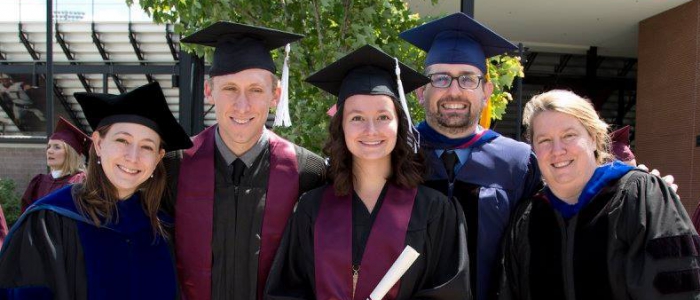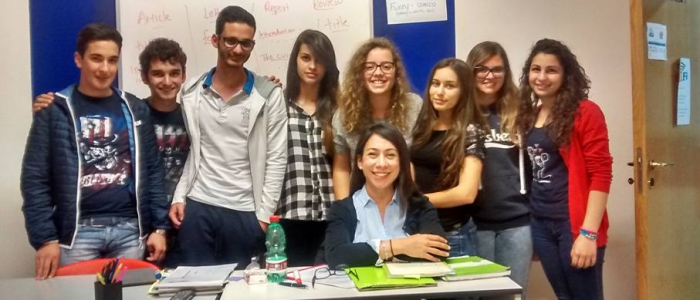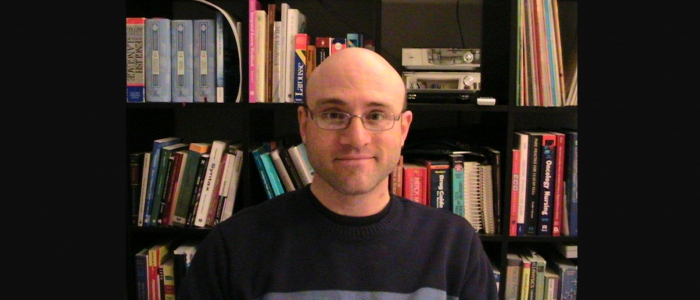Our grad programs offer rigorous academic training that prepares you for a career in academia and in industry linguistics careers at companies such as Amazon and M*Modal. Below are profiles of some of our recent alumni.
Featured Alumni

Alumni Profile: Katherine I. Martin
Assistant Professor Katherine I. Martin (left) with her fellow linguistics faculty at Southern Illinois University Carbondale.
Katherine I. Martin received her PhD in applied linguistics in 2015. She is now Assistant Professor, Department of Linguistics, Southern Illinois University Carbondale, where she teaches classes that mostly focus on training bilingual and ESL teachers, at both the graduate and undergraduate level. Katherine writes:
“My most memorable - and enduringly useful - experience was really two different things that tie together. First, my experience teaching English as a second language in the English Language Institute (part of Pitt’s Department of Linguistics) sparked my interest in understanding literacy acquisition, which is still my area of research focus today. Second, every time I would come to my advisor Alan Juffs with an idea for a project, he would listen, nodding along, and then ask "But why do I care?" This perspective - of always wanting the research to have some specific, real-world application, fundamentally shaped the way I think about the work that I do. The opportunity to use my real-life experiences to inspire my research, and use my research to have real-life impacts, is probably the most influential (and memorable) part of my experience at Pitt.”

Alumni Profile: Noriyasu Li
Noriyasu Harada Li (pictured on the right) is a Senior Product Manager at Zoom. He is primarily responsible for working on features related to Machine Transcription, Machine Translation, and Captions at Zoom. Prior to joining Zoom, he was a Product Manager and Language Engineer at Amazon, and was a core member of Alexa's Japan launch in 2018. He received his Ph.D in Linguistics in 2017 from the University of Pittsburgh. During his PhD studies, he conducted research on SLA, syntax, L2 phonological acquisition, L2 orthographic knowledge and writing development, and acquisition of tense/aspect in Japanese.
Nori writes:
"I've been fortunate to have many different experiences and opportunities since graduating and working at Amazon and Zoom. No matter what role or project I've taken, I still apply many of the knowledge and skills I acquired in my graduate studies to my work on a daily basis. I never thought I'd be in a product role coming out of graduate school, but you never know where may end up."
Nori writes:
"I've been fortunate to have many different experiences and opportunities since joining Amazon. No matter what role or project I've taken, I still apply many of the knowledge and skills I acquired in my graduate studies to my work on a daily basis. In particular, Amazon is a 'writing culture,' and writing all of those abstracts, summaries, and research proposals during grad school are translating well when writing PR-FAQs, Business Requirement Documents, and other project documents at Amazon. I never thought I'd be in a product role coming out of graduate school, but you never know where may end up."
Nori writes:
"I apply many of the knowledge and skills I acquired in my graduate studies to my work on a daily basis. I develop novel methods of analyzing user utterance data through Python and Pandas (computational linguistics), quality control of Japanese NLU artifacts and models (syntax and semantics), guidance and feedback on automated speech recognition in Japanese (phonology), and performing deep dives and reporting results to management (data analysis)."

Alumni Profile: Adrienne Washington
Adrienne Washington recieved her PhD in 2016 and is now Assistant professor of interdisciplinary studies at Norfolk State University. She teaches several courses on Language & Society, where students explore language use at its intersections with different aspects of social life, including thought, mass news media, politics, race and ethnicity, gender and sex. Her research specializes in sociocultural linguistics with a particular focus on the use of language within education, for identity work, and for meaning making within black communities of the U.S. and Brazil. She was just quoted in this NYT article discussing pandemic nicknaming.
Adrienne writes:
"The linguistics program at Pitt encourages and often even requires students to complete their coursework and training with professors whose work explores distinct dimensions of language. Thus, while the program provides students with a strong foundation in the principal areas of linguistics, my training has also equipped me to comprehensively study language as a historical, anthropological, sociological, sociocultural, and educational phenomenon and to understand the value of an integrative education. My diverse linguistics graduate training has furthermore empowered me to explore the complex and intersectional themes, such as language use vis-à -vis race, nationhood, gender, inequality, and education, fields that I currently research and teach."

Alumni Profile: Héctor Ramírez-Cruz
Héctor Ramírez-Cruz (right) pictured with Professor Hubert Devonish at the 21st Conference of the Society for Caribbean Linguistics in Jamaica.
Hector Ramirez Cruz received his PhD in Hispanic Linguistics in 2017. He is currently Associate Professor of Linguistics, Universidad Nacional de Colombia, where he teaches courses in linguistics at both the undergraduate and graduate levels. Hector is passionate about linguistics and how people make sense of their lives through language, discourse, and narratives.
He writes:
“I loved the social part of studying at Pitt. I remembered when meeting with classmates and sometimes professors at Hemingways to celebrate a paper defense or informal social meetings to open or close an academic term either on campus, in Schenley Park, or at a professor or classmate's home. These were opportunities to approach people from other perspectives, develop a warming environment, and foster a sense of community in the program.”

Alumni Profile: Lauren Collister
Lauren Collister (left) meeting at Rep Mike Doyle's office in Washington D.C. to advocate for public access to research data. Lauren Collister received her PhD in Sociolinguistics in 2013. She is currently Director, Office of Scholarly Communication and Publishing at the University Library System, University of Pittsburgh. She oversees the journal publishing, self-archiving repositories, open access education, electronic theses and dissertations, and copyright work for the University Library System at the University of Pittsburgh.
Lauren writes:
“The practice of being a scholar has been valuable for this position because I know something of what scholars go through when publishing and trying to share their work. Working on papers and trying to publish them as well as presenting at conferences prepared me more for this position than any formal education that I had. The obstacles to finding and sharing research work became evident to me during the course of my graduate work, and often got in the way of some of the things I wanted to do with my research and projects. That instilled in me a strong sense of the need for better systems and better laws to protect and help scholars as creators of knowledge.”

Alumni Profile: Hillary Schepps
Hillary Schepps received the MA in Applied Linguistics (SLA) and TESOL Certificate in 2014. She is currently Director of studies and co-owner of Intuition, a language school in Bologna, Italy. Hillary writes:
"My linguistics graduate work included not only the MA and TESOL certificate but also a teaching assistantship at the English Language Institute. Teaching at the ELI while I earned my degree allowed me to put theory into practice, instantly verifying the utility of everything I was studying. It also helped me generate research questions about L1 influence on EFL development which ultimately became the topic of my thesis and is still a critical consideration in my current role. A lot of the courses required for TESOL are directly applicable to my current position: Materials, Assessment, Linguistic Structures of English, and so on. In fact, I apply the principles I learned at Pitt on a daily basis. Just this morning I referred to Bloom’s taxonomy when justifying to a client why a student’s level of English isn’t quite as high as she maintained!"

Alumni Profile: Roberto Aranovich
Roberto Aranovich received his PhD in 2011 and is now Senior Associate Development Manager at M*Modal, a company that provides medical speech recognition, medical transcription, CDI, and coding.
Roberto writes context-free grammars used to parse clinical documents. This is a necessary step in order to allow the M*Modal system to understand the documents and extract discrete information from them. The information is later used to support reasoning systems that produce alerts and summarize the information for doctors.
Roberto writes:
“My graduate studies prepared me for my position by providing me with a deep understanding of the core structure of language as well as the fact that language is intrinsically variable and that the answer to linguistic questions are basically empirical.”